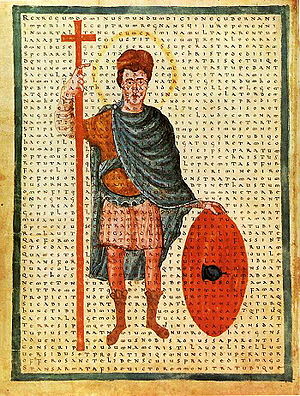Our website is made possible by displaying online advertisements to our visitors.
Please consider supporting us by disabling your ad blocker.
Succession of the Roman Empire

The continuation, succession, and revival of the Roman Empire is a running theme of the history of Europe and the Mediterranean Basin. It reflects the lasting memories of power, prestige, and unity associated with the Roman Empire.
Several polities have claimed immediate continuity with the Roman Empire, using its name or a variation thereof as their own exclusive or non-exclusive self-description. As centuries went by and more political ruptures occurred, the idea of institutional continuity became increasingly debatable. The most enduring and significant claimants of continuation of the Roman Empire have been, in the East, the Ottoman Empire and Russian Empire, which both claimed succession of the Byzantine Empire after 1453; and in the West, the Carolingian Empire (9th century) and the Holy Roman Empire from 800 to 1806.
Many of these claims were monarchist in nature, with the ethnic or national identity of the Ancient Romans never actually becoming established among the common people (poor peasants and urban workers) of these empires (except in the Byzantine Empire), the idea of succession being restricted to niche groups of intellectuals and members of the elites. Thus, when these empires were replaced by successor states that are republics (such as the Republic of Turkey, the Federal Republic of Germany and the Soviet Union and later the Russian Federation) there was an abandonment of these claims.
In relation to ethnic and national identity, the Italians of Rome continue to identify with the demonym 'Roman' to this day.[1][2][3] The vast majority of the Western Romance peoples (Portuguese, Spaniards, French, their colonial descendants, among others) diverged into groups that no longer identify as Romans. The Romansh people of Switzerland however, identify as Romans, and similar subnational "Roman" identity exists in the case of Romagnol. Roman identity is claimed by several Eastern Romance peoples. Prominently, the Romanians call themselves români and their nation România.[4] And the modern Greek people still sometimes use Romioi to refer to themselves, as well as the term "Romaic" ("Roman") to refer to their Modern Greek language (but the term Éllines and Hellēnikḗis are much more popular among the Greeks to refer to themselves and their language)[5]
Separately from claims of continuation, the view that the Empire had ended has led to various attempts to revive it or appropriate its legacy, notably in the case of Orthodox Russia. The vocabulary of a "Third Rome", the "First Rome" being Rome in Italy and the "Second Rome" being Constantinople in the Byzantine Empire, has been used to convey such assertions of legitimate succession.
- ^ Wilcox 2013.
- ^ Vandiver Nicassio 2009, p. 21.
- ^ Ridley 1976, p. 268.
- ^ Berciu Drăghicescu 2012, p. 788.
- ^ Merry 2004, p. 376; Institute for Neohellenic Research 2005, p. 8; Kakavas 2002, p. 29.
Previous Page Next Page
توالي الإمبراطورية الرومانية Arabic جانشینی امپراتوری روم FA Succession de l'Empire romain French יורשות רומא HE Suksesi Kekaisaran Romawi ID Successione dell'Impero romano Italian Сукцесија Римског царства Serbian Правонаступництво Римської імперії Ukrainian رومن سلطنت کی جانشینی UR 第三羅馬 ZH-CLASSICAL


